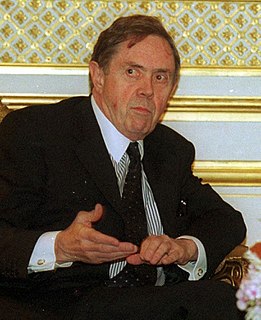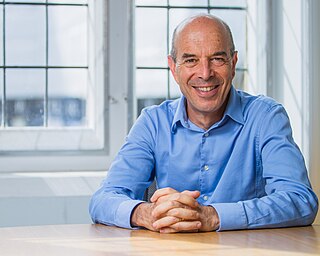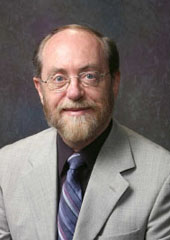Corporate governance is the collection of mechanisms, processes and relations used by various parties to control and to operate a corporation. Governance structures and principles identify the distribution of rights and responsibilities among different participants in the corporation and include the rules and procedures for making decisions in corporate affairs. Corporate governance is necessary because of the possibility of conflicts of interests between stakeholders, primarily between shareholders and upper management or among shareholders.

Donald James Johnston, is a Canadian former politician, lawyer, and was Secretary-General of the Organisation for Economic Co-operation and Development (OECD) from 1996 to 2006.
Governance is all the processes of interactions be they through the laws, norms, power or language of an organized society over a social system. It is done by the government of a state, by a market, or by a network. It is the decision-making among the actors involved in a collective problem that leads to the creation, reinforcement, or reproduction of social norms and institutions". In lay terms, it could be described as the political processes that exist in and between formal institutions.
Aid effectiveness is the degree of success or failure of international aid. Concern with aid effectiveness might be at a high level of generality, or it might be more detailed.

Mahmoud Mohieldin, is the World Bank Group's senior vice president for the 2030 Development Agenda, UN Relations, and Partnerships. He serves as a board member on the Global Partnership for Sustainable Development Data, as well as an observer to the EU Multi-Stakeholder Platform for the SDGs. Mohieldin previously served as corporate secretary, president's special envoy, and managing director for the World Bank Group.

Dr. Nasser Saidi is a Lebanese politician and economist who served as the Minister of Economy and Industry and the Vice Governor for the Lebanese central banks for several terms in the last decade of the 20th century.

The Centre for Development Studies (CDS), Thiruvananthapuram, Kerala, India was a civil service training institution. But now it is a higher education institution providing M.A Course in Applied Economics and PhD course in Economics. It is a very reputed institution internationally also. Its main objective is to promote research, teaching and training in disciplines relevant to development.

Ian Andrew Goldin is a South African-born British professor at the University of Oxford in England, and was the founding director of the Oxford Martin School at the University of Oxford. He is Professor of Globalisation and Development, holds a professorial fellowship at Balliol College, Oxford, is director of the Oxford Martin Research Programmes on Technological and Economic Change, Future of Work and Future of Development.
David John Bradbury is a former Australian politician. He was a Labor member of the Australian House of Representatives, representing the Division of Lindsay, in New South Wales, from 2007 until 2013. Bradbury was the Minister for Competition Policy and Consumer Affairs, Assistant Treasurer, Minister Assisting for Financial Services and Superannuation, and Minister Assisting for Deregulation. He is currently the Head of Tax Policy and Statistics at the Organisation for Economic Co-operation and Development's Centre For Tax Policy and Administration.

Christopher Freeman was a British economist, the founder and first director of Science Policy Research Unit at the University of Sussex, and one of the most eminent researchers in innovation studies, modern Kondratiev wave and business cycle theorists. Freeman contributed substantially to the revival of the neo-Schumpeterian tradition focusing on the crucial role of innovation for economic development and of scientific and technological activities for well-being.
Michael Ward was a British economist and statistician who contributed significantly to the evolution of the international statistical system in the post-war period.
Heinz Wolfgang Arndt was a German-born Australian economist.

Louka Katseli is a Greek economist and politician. Today, she is Professor Emeritus of the National and Kapodistrian University of Athens, Chair of the National Bank of Greece in Cyprus, CEO of Rightholders Cooperative EDEM, Vice President of the African Capacity Building Foundation (ACBF), member of the Independent Commission for Sustainable Equality, Progressive Alliance of Socialists and Democrats - S&D, and business consultant for enterprises and organizations in Greece and Europe.
The Austrian Institute of Economic Research is a private non-profit association located in Vienna, Austria.

The Organisation for Economic Co-operation and Development is an intergovernmental economic organisation with 38 member countries, founded in 1961 to stimulate economic progress and world trade. It is a forum of countries describing themselves as committed to democracy and the market economy, providing a platform to compare policy experiences, seek answers to common problems, identify good practices and coordinate domestic and international policies of its members. Generally, OECD members are high-income economies with a very high Human Development Index (HDI) and are regarded as developed countries. As of 2017, the OECD member countries collectively comprised 62.2 % of global nominal GDP and 42.8 % of global GDP at purchasing power parity. The OECD is an official United Nations observer.
Masahiko Aoki was a Japanese economist, Tomoye and Henri Takahashi Professor Emeritus of Japanese Studies in the Economics Department, and Senior Fellow of the Stanford Institute for Economic Policy Research and Freeman Spogli Institute for International Studies at Stanford University. Aoki was known for his work in comparative institutional analysis, corporate governance, the theory of the firm, and comparative East Asian development.
Alexandra Mitsotaki is a Greek activist and social entrepreneur. She is cofounder and president of the World Human Forum. In 2019 she launched the Convergences Greece Forum. She founded ActionAid Hellas in 1998 and served as its chair until 2017. In this capacity, in 2014 she co-founded Greece's first microcredit institution, Action Finance Initiative (AFI). In 2009 she became president of the Greek Cultural Centre in Paris.

Gabriel Zucman is a French economist known for his research on tax havens and corporate tax havens from his 2015 book The Hidden Wealth of Nations: The Scourge of Tax Havens. Zucman is also known for his work on the quantification of the financial scale of base erosion and profit shifting (BEPS) tax avoidance techniques employed by multinationals in corporate tax havens, through which he identified Ireland as the world's largest corporate tax haven in 2018. Zucman showed that the leading corporate tax havens are all OECD–compliant, and that tax disputes between high–tax locations and havens are very rare. Zucman's papers are some of the most cited papers on research into tax havens. In 2018, Zucman was the recipient of the Prize for the Best Young Economist in France, awarded by the Cercle des économistes and Le Monde in recognition of his research on tax evasion and avoidance and their economic consequences. He is currently an Associate Professor of Public Policy and Economics at the University of California, Berkeley‘s Goldman School of Public Policy.

John F. Helliwell is a Canadian economist and editor of the World Happiness Report. He is a Senior Fellow of the Canadian Institute for Advanced Research (CIFAR) and Co-Director of the CIFAR Programme on Social Interactions, Identity, and Well-Being; Board Director of the International Positive Psychology Association, and Professor Emeritus of Economics at the University of British Columbia.










